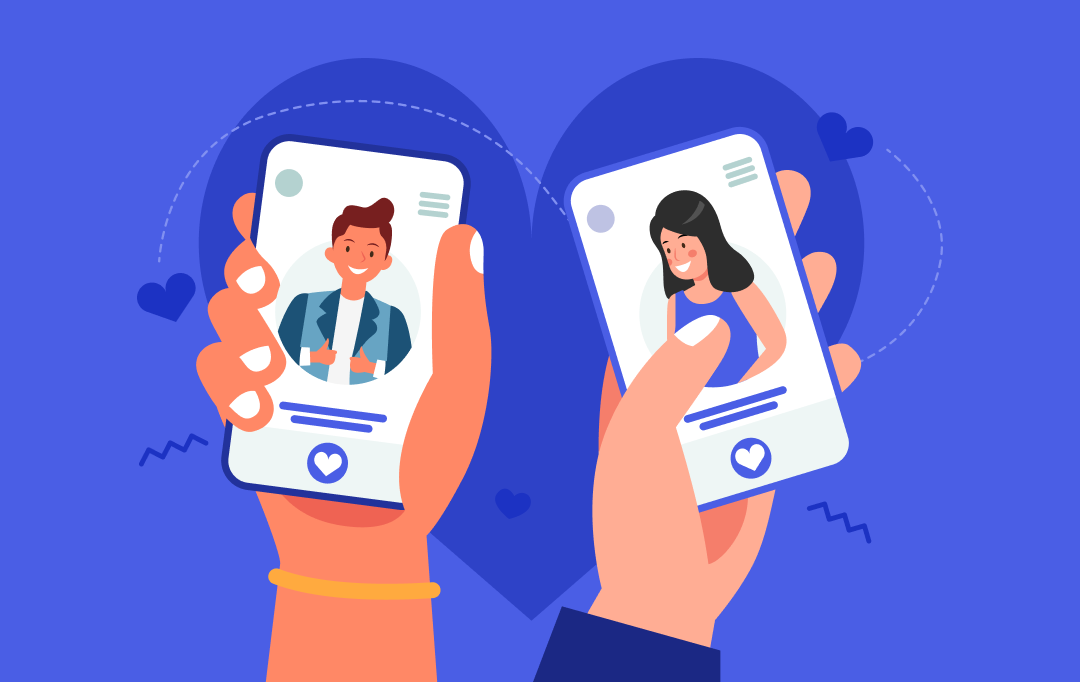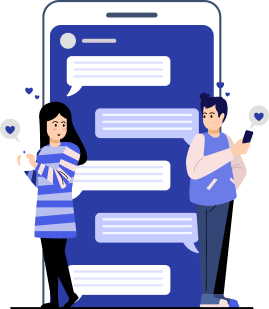- Inside Grindr’s Rise: From Niche Idea to Global Benchmark
- How Much Does It Cost to Build a Dating App Like Grindr?
- Factors Affecting the Cost of Developing a Dating App Like Grindr
- Feature Complexity
- Privacy & Security
- Platform Selection
- Scalability & Infrastructure
- Third-Party Integrations
- Design & User Experience
- Technology Stack
- Maintenance & Support
- Surprise Expenses to Watch Out for in Grindr App Development
- App Store Fees and Compliance
- Third-Party API and Licensing Fees
- Data Storage and Backup Costs
- Legal Fees and Ongoing Compliance
- Marketing and User Acquisition
- Continuous Updates and Feature Expansion
- Cost Optimization Strategies for Developing a Dating App Like Grindr
- Start with an MVP
- Leverage Cross-Platform Development
- Prioritize What Matters
- Outsource Where It Makes Sense
- Use Scalable Infrastructure
- Keep Iterating After Launch
- Automate the Repetitive Work
- Core Features of Developing a Dating App Like Grindr
- User Registration & Profile Setup
- Location-Based Matching
- Advanced Search & Filters
- Chat & Messaging
- Profile Discovery
- Push Notifications & Alerts
- Security & Privacy Controls
- Media Sharing
- Activity & Status Indicators
- Advanced Features to Integrate in a Dating App Like Grindr
- AI-Powered Matchmaking
- In-App Video & Voice Calls
- Safety Features & Moderation Tools
- Events & Communities
- Gamification & Engagement Boosts
- Premium Subscription Models
- Multi-Language & Localization
- Social & Community Features
- API & Third-Party Integrations
- The Roadmap to Building a Grindr-Like Dating App
- Market Research & Feasibility Study
- Defining App Features
- Choosing the Right Technology Stack
- Designing the UI/UX
- Development Phase
- Security & Privacy Implementation
- Testing Phase
- Launch & Marketing
- Post-Launch Support & Maintenance
- How Apps Like Grindr Make Money: Understanding the Monetization Strategies
- Subscription Plans
- In-App Purchases
- Advertising
- Event Promotions & Partnerships
- Affiliate & Service Integrations
- Data-Driven Insights (Ethical Use)
- Challenges in Developing a Dating App Like Grindr
- Why Partner with Appinventiv for Your Grindr-Like Dating App Development
- Experience That Matters
- Security Comes First
- A Tailored Approach
- Ready for Growth
- Support Beyond Launch
- FAQs
Key takeaways:
- The cost to build a dating app like Grindr ranges between $40,000 and $200,000+, depending on features and scale.
- Privacy, security, and compliance with global data laws are major cost drivers in LGBTQ+ dating app development.
- Advanced features like AI matchmaking, video calls, and community tools increase overall development costs.
- The global dating app market is growing rapidly, creating huge potential for early movers.
- Starting with an MVP and using cross-platform frameworks can help optimize initial costs.
- Ongoing legal reviews, data protection, and moderation efforts add to long-term expenses.
Boardrooms across industries are buzzing with one reality: niche digital platforms are no longer “side plays”-they are market leaders in their own right. Nowhere is this more evident than in the LGBTQ+ dating app space, where adoption rates are soaring, and user engagement is rewriting the rules of the dating economy.
At the center of this revolution stands Grindr. More than just a dating app, it’s become the global benchmark for inclusive digital platforms, proving that hyper-focused communities can drive massive scale, loyalty, and monetization. Its ability to blend location-based technology with real-time human connection has made it a gold standard that business leaders can’t ignore.
For CEOs, CTOs, and digital leaders, the question is no longer “Should we explore this space?” but is “How fast can we build and scale?” And that leads us to the practical discussion: the cost to build a dating app like Grindr. The investment isn’t one-size-fits-all as it shifts depending on the features, compliance, security, and vision you want to execute. Still, to give you a brief idea, you can expect the cost to vary from $40,000 to $200,000 or more.
This blog takes you through the entire roadmap: the factors affecting Grindr-like app development cost, the features and tech stack that matter most, monetization strategies, and the challenges you’ll face (with solutions). By the end, you’ll have clarity on what it really takes to go from an idea to a scalable global product.
Before we dive into the cost side, it’s worth pausing to look at Grindr itself and why it has become such a strong reference point for anyone exploring LGBTQ+ dating app development.
Global dating apps crossed $6.1B in revenue in 2024, and Grindr alone pulled in $104M in a single quarter. The opportunity is massive but it starts with knowing your costs.
Inside Grindr’s Rise: From Niche Idea to Global Benchmark
Grindr came out in 2009 with a very clear idea- make it easy for gay, bisexual, transgender, and queer people to connect with others nearby. The execution was simple, but the impact was massive. What started as a location-based hookup app grew into something broader: safe spaces, community filters, and premium memberships. It wasn’t just about matching, it was about building a community that people could trust.
From the business side, the numbers are the real proof. In Q2 2025, Grindr brought in about $104 million in revenue, which was up 27% compared to the same period last year. Over a 12-month stretch, revenue crossed $385 million. Out of roughly 14.5 million average monthly active users, more than a million pay for subscriptions. These figures show what leaders already suspect- which is that subscription models and in-app upgrades aren’t just nice to have, they’re sustainable ways to grow at scale.
The network effect is Grindr’s real strength. More users in one area means more value for everyone else in that area, and that creates a flywheel. Add to that daily engagement which includes people opening the app multiple times, spending real minutes on it and you get loyalty that broader dating apps find tough to match. Compliance and data security also add confidence, which matters to both users and investors.
For businesses, the message is straightforward. This is a category producing visible ROI. Global dating app revenue hit $6 billion in 2024 and is climbing every year. Waiting too long to enter only makes things harder. For instance, acquisition costs go up, competition gets tighter, and you miss a moving market. Leaders who commit early to LGBTQ+ dating app development stand to capture revenue and long-term relevance in one of the fastest-growing digital markets.
How Much Does It Cost to Build a Dating App Like Grindr?
The cost to build a dating app like Grindr depends on the choices you make. You’re not just paying for coding but also covering design, geolocation, chat infrastructure, data security, and compliance. Each of those adds to the bill, and cutting corners usually shows up later in higher churn or safety risks.
On the lower side, you can expect around $40,000 to $70,000 for an MVP, which includes profiles, location-based matching, and basic chat. That’s enough to test the waters. On the higher side, when businesses aim for full-scale Grindr-like app development with AI-driven matchmaking, video calls, advanced moderation, and enterprise-level scalability, costs push past $200,000.
The range looks wide because it is. Some leaders want a quick entry into the market to validate demand. Others aim for a global, feature-rich product from day one. Both are valid approaches, but the timelines, budgets, and ROI curves are very different.
For those planning to seriously invest in LGBTQ+ dating apps, the investment isn’t small, but in a category where demand keeps growing, the payoff can be significant.
A straightforward way to estimate the cost to develop an LGBTQ+ dating app is by using this formula:
Development Time × Hourly Rate = Total Development Cost
- Development Time: Total hours spent on research, design, coding, testing, and deployment. The more complex the features, the more time required.
- Hourly Rate: This varies depending on the overall expertise of your app development partner.
To give you a clearer picture, here’s a breakdown of typical phases in LGBTQ+ dating app development and their cost ranges:
| Phase | Timeline | Estimated Cost |
|---|---|---|
| Research & Planning | 2–4 weeks | $5,000 – $15,000 |
| UI/UX Design | 3–6 weeks | $7,000 – $25,000 |
| Core Development | 4–8 months | $40,000 – $120,000 |
| Security & Compliance | Ongoing | $15,000 – $40,000 |
| Testing & QA | 1–2 months | $8,000 – $25,000 |
| Deployment & Launch | 2–4 weeks | $3,000 – $10,000 |
| Maintenance & Updates | Ongoing/monthly | $2,000 – $12,000 |
Now that you have a sense of the numbers, the next step is to dig into what shapes those costs. Everything from feature complexity to compliance with privacy laws, from the scalability of your backend to the integrations you choose, plays a role in the final budget. For leaders exploring gay dating app development or looking at a Grindr clone app, these factors are where strategy meets execution and where smart planning can make the difference between overspending and optimizing ROI.
Factors Affecting the Cost of Developing a Dating App Like Grindr
There’s no flat price tag when it comes to the cost to build a dating app like Grindr. The figure shifts depending on what you want your product to do, how secure it needs to be, and how far you plan to scale it. Let’s break down the factors affecting the cost to develop a dating app like Grindr.
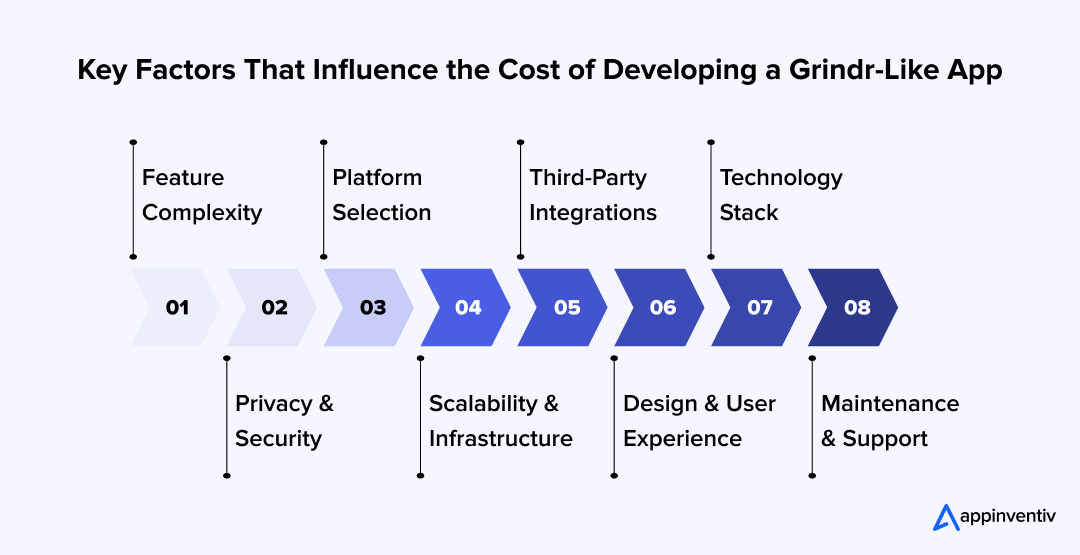
Feature Complexity
Start simple, and costs stay manageable. Add real-time chat, location matching, and profile setup, and you’re in MVP territory. But if you move into advanced territory which includes features like AI matchmaking, video calling, or live safety alerts, your budget climbs fast. That’s where most gay dating apps see the biggest jump.
Privacy & Security
This isn’t just another social app. For LGBTQ+ communities, safety and discretion are non-negotiable. Encryption, anonymous browsing, or stronger login methods all add engineering hours. Yes, they raise the Grindr clone app development costs, but without them you don’t have a product people can trust.
Platform Selection
Do you build native apps for iOS and Android separately, or go cross-platform with Flutter or React Native? Native is more expensive but gives you deeper customization and smoother performance. Cross-platform helps trim the dating app development cost, though sometimes at the expense of flexibility.
Scalability & Infrastructure
A dating app isn’t built for a hundred users but is built for thousands logging in at once. Real-time chat, push notifications, even live video all demand serious backend work. Cloud infrastructure, load balancing, and monitoring systems add to the bill, but without them, growth will break your product.
Third-Party Integrations
Payments, social logins, chat APIs, all these features save time, but every integration carries setup and licensing fees. If you want subscription payments or premium add-ons, expect your cost to develop a dating app like Grindr to reflect those recurring expenses.
Design & User Experience
Users don’t return to a clunky interface. Smooth swipes, clean profiles, intuitive navigation, these don’t come cheap. But when retention and monetization rely on engagement, cutting corners on design is rarely worth the savings.
Technology Stack
Your backend and database choices determine how fast, secure, and scalable the app will be. Using frameworks like Node.js with WebSockets or Firebase for real-time data boosts performance, but requires specialists. That expertise pushes costs higher.
Maintenance & Support
The spend doesn’t stop on launch day. Regular bug fixes, compliance updates, and rolling out new features are part of the long game. For most LGBTQ+ dating app development projects, ongoing support & maintenance ranges anywhere from $2,000 to $12,000 per month.
Surprise Expenses to Watch Out for in Grindr App Development
The headline budget tells only half the story. A real-world Grindr-like app development cost also includes quieter expenses that show up once the product is live.
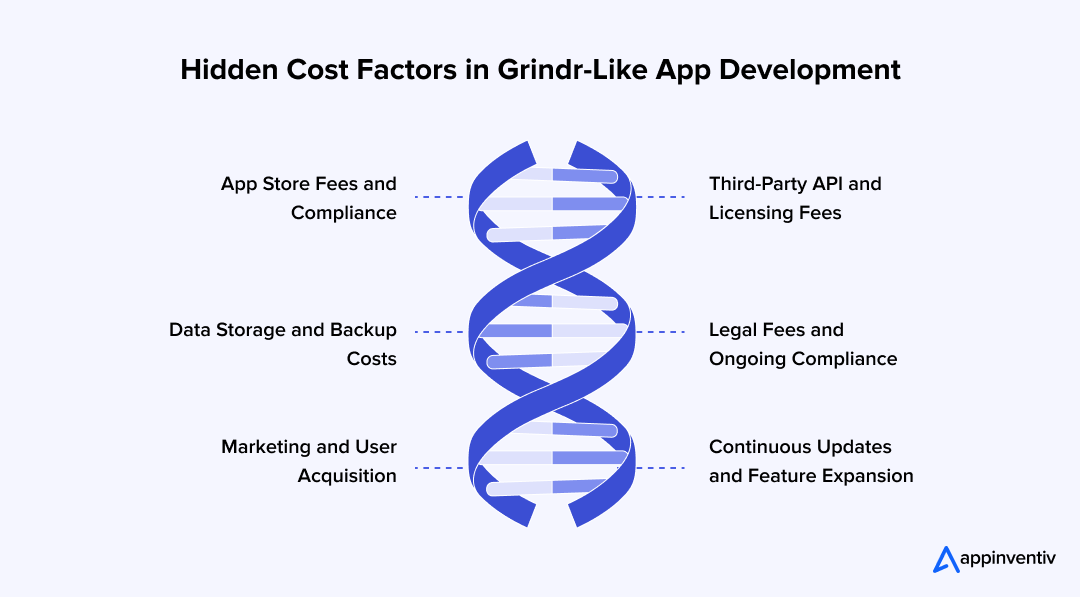
App Store Fees and Compliance
Apple and Google both charge for publishing and ongoing developer accounts. Add to that their compliance reviews, which often require extra dev work, and you’ve got a line item most teams underestimate.
Third-Party API and Licensing Fees
Using services like location APIs, video call SDKs, or moderation tools speeds up development. But every one of them has a price tag that grows with your user base.
Data Storage and Backup Costs
Dating apps create massive amounts of personal data. Hosting it securely and setting up regular backups is not a one-time spend, it’s a monthly bill that scales as you grow.
Legal Fees and Ongoing Compliance
Regulations such as GDPR, CCPA, or other regional laws mean ongoing legal reviews and documentation. In gay dating app development ecosystem, this is doubly important to protect both your users and your brand.
[Also Read: Top Legal Issues in Mobile App Development in 2025]
Marketing and User Acquisition
You can’t just build an app and expect users to show up. Paid ads, influencer partnerships, SEO, and app store optimization all demand significant budgets. For many, these costs rival the initial build.
Continuous Updates and Feature Expansion
The dating market evolves quickly. To keep users engaged, you’ll need to roll out new features like AI recommendations, safety updates, maybe even video experiences. Each round of innovation adds to your long-term cost.
Cost Optimization Strategies for Developing a Dating App Like Grindr
The cost to build a dating app like Grindr doesn’t have to spiral out of control. A lot depends on how you start, what you prioritize, and where you decide to spend less. Businesses that treat every feature as a must-have on day one usually end up paying far more than they should.
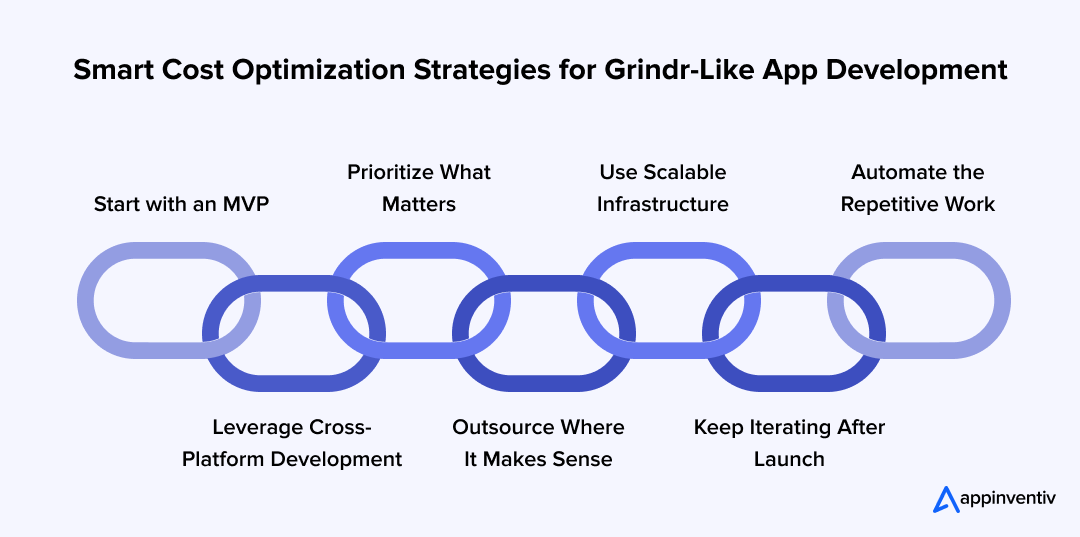
Start with an MVP
Don’t overbuild. Get the basics right, such as profiles, location, chat and then release it. You’ll learn far more from real users than from long planning decks. Once you see what people actually want, you can layer in advanced dating app development features like AI-driven matches or video calling. That keeps early spending lean while still leaving room to grow.
Leverage Cross-Platform Development
Separate iOS and Android builds eat budgets quickly. Using Flutter or React Native gives you one codebase and both platforms covered. It’s not perfect for every scenario, but if your goal is to test demand and keep Grindr clone app development costs under control, this is often the smarter play.
Prioritize What Matters
It’s tempting to load the first version with everything under the sun. Resist it. Ask: which three features will keep someone coming back tomorrow? Build those. Push the rest into later updates. That way, your cost to develop a LGBTQ+ dating app goes into things that actually move the needle.
Outsource Where It Makes Sense
Not every function deserves a full in-house team. Security testing, compliance checks, even design sprints can be handled by specialized partners. Outsourcing app development keeps your fixed costs lower and gives you access to top talent without carrying them on payroll.
Use Scalable Infrastructure
Dating apps grow fast when they work. That growth can break a fragile backend. Cloud setups that scale with demand stop you from rebuilding later is a hidden expense many founders forget. Pay for what you need now, expand only when traffic justifies it.
Keep Iterating After Launch
Don’t think of launch as the finish line. It’s the start. Roll out fast, gather feedback, and improve in cycles. Iterating ensures you’re not spending big money on features that sounded great in planning but land flat in practice.
Automate the Repetitive Work
Testing and deployment chew up time and money if you rely only on manual work. Automation tools won’t remove the need for people, but they cut costs and mistakes. Faster releases, fewer bugs, lower long-term spend.
Core Features of Developing a Dating App Like Grindr
The basics are what make or break the experience. Without these, even the smartest dating apps won’t hold users for long.
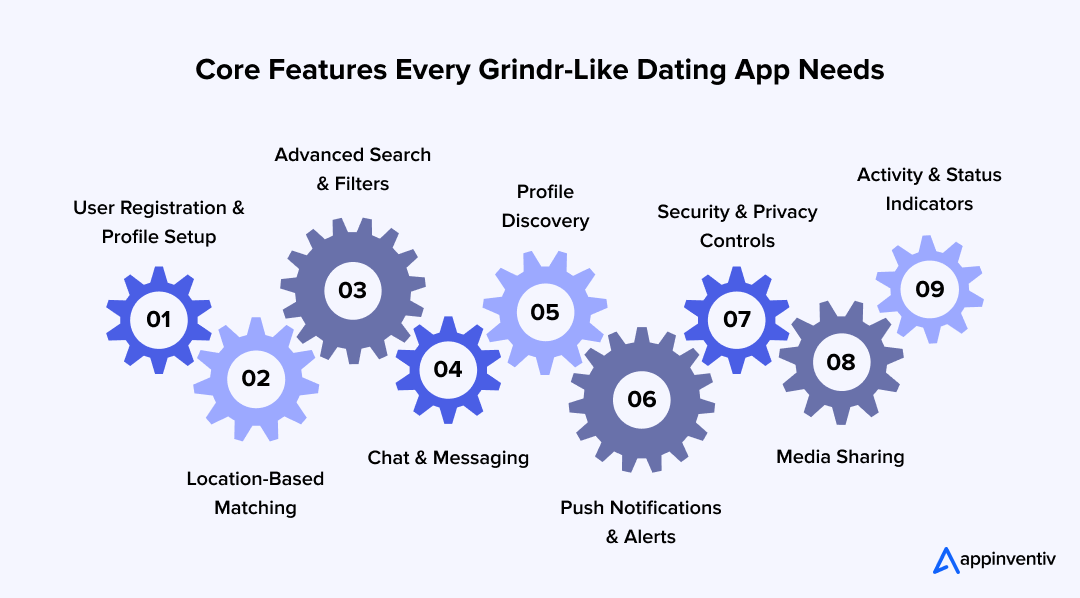
User Registration & Profile Setup
Onboarding should feel quick, not like filling out a form. Give users options like email, phone, or social logins and let them add photos, bios, and preferences right away. Simple verification steps reduce fake profiles and set the tone for trust.
Location-Based Matching
This is the feature Grindr is known for. Showing people nearby makes the app feel immediate and alive. Users should be able to adjust distance filters and hide their location if they want extra privacy.
Advanced Search & Filters
Not everyone is looking for the same thing. Filters for age, relationship goals, or lifestyle habits let users narrow the pool fast. Saved searches add convenience for people who know exactly what they want.
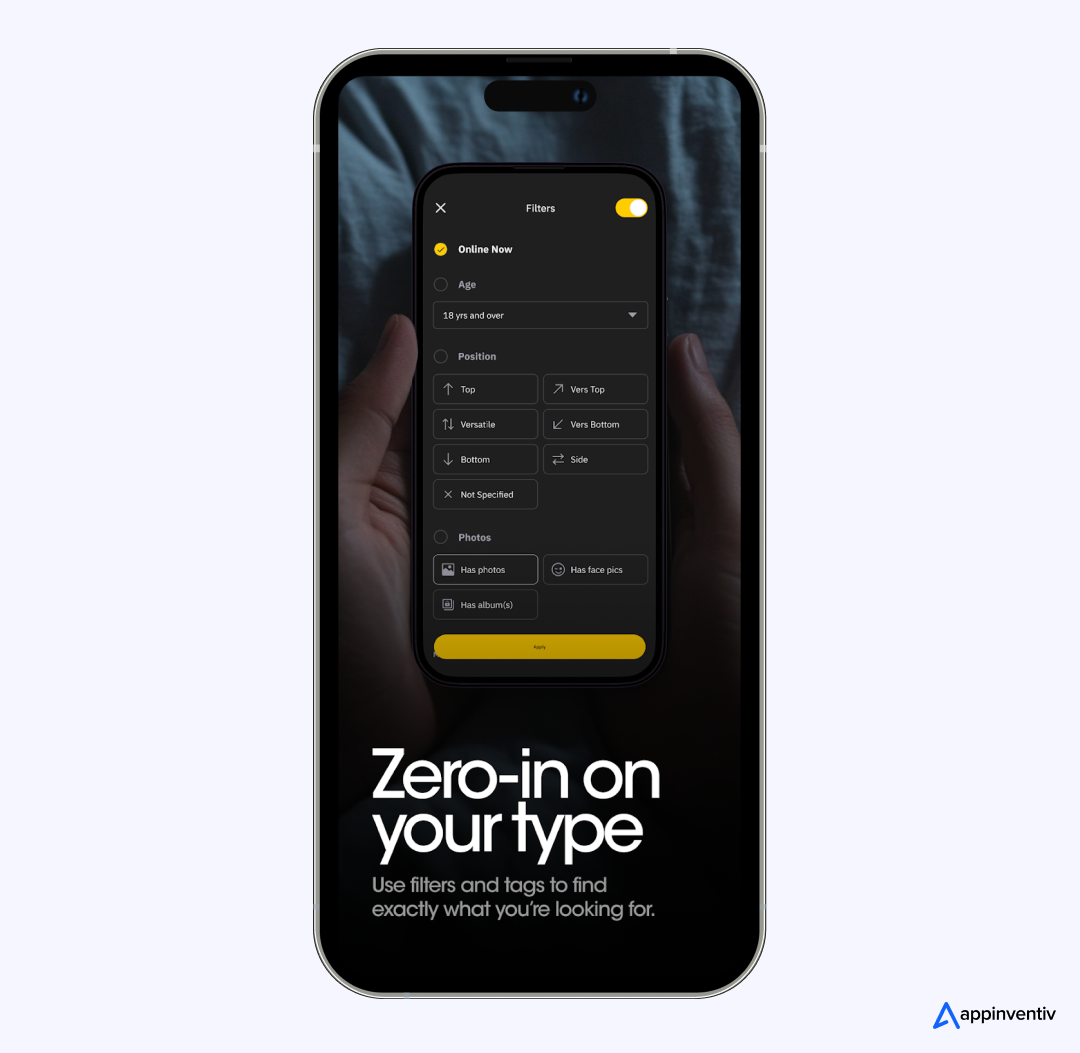
Chat & Messaging
Conversations keep users engaged. A solid chat system needs text, photos, voice notes, maybe even GIFs. Read receipts and typing indicators make chats feel real, not static.
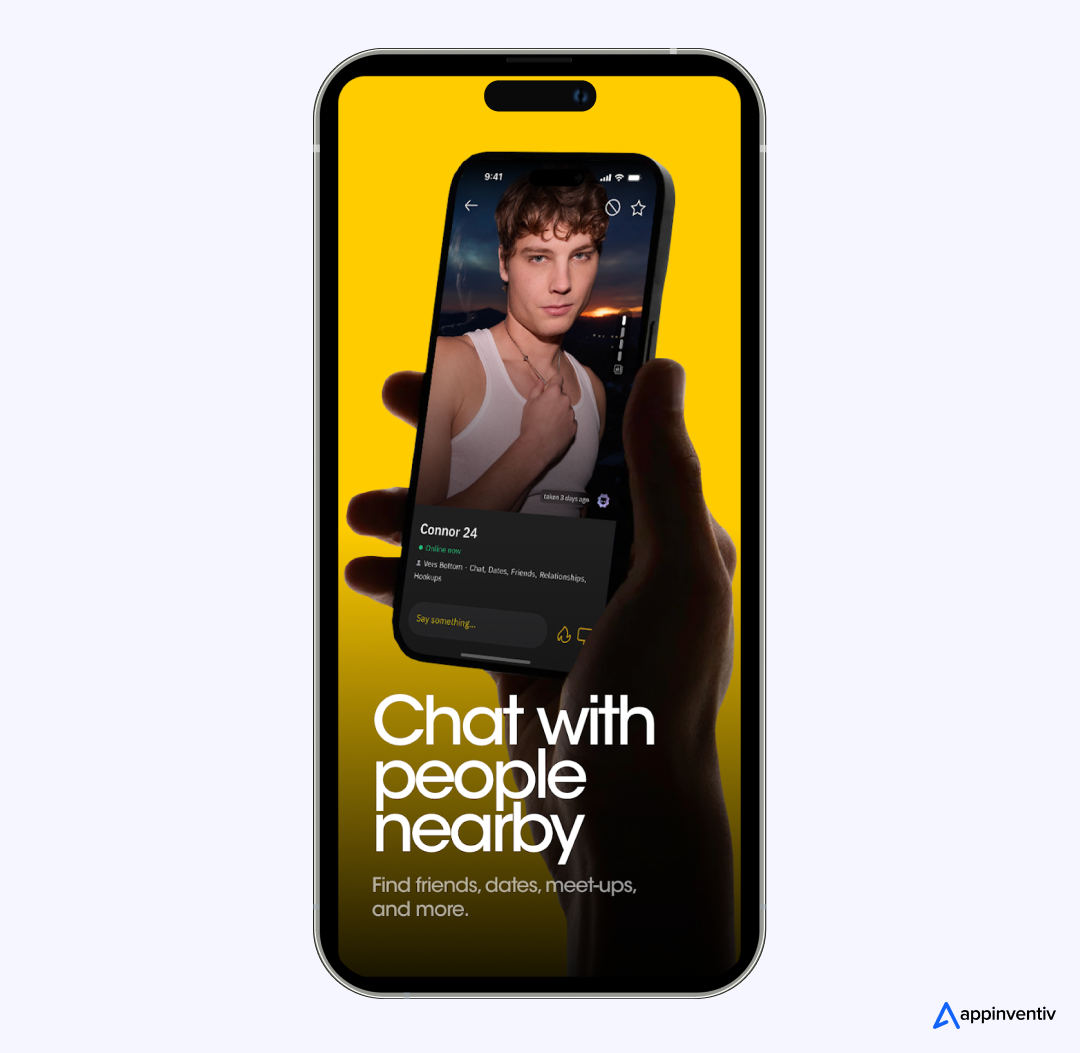
Profile Discovery
Swiping isn’t the only way to explore. A grid layout or profile previews make browsing simple. Quick connect actions like a tap to start a chat and keep the flow natural.
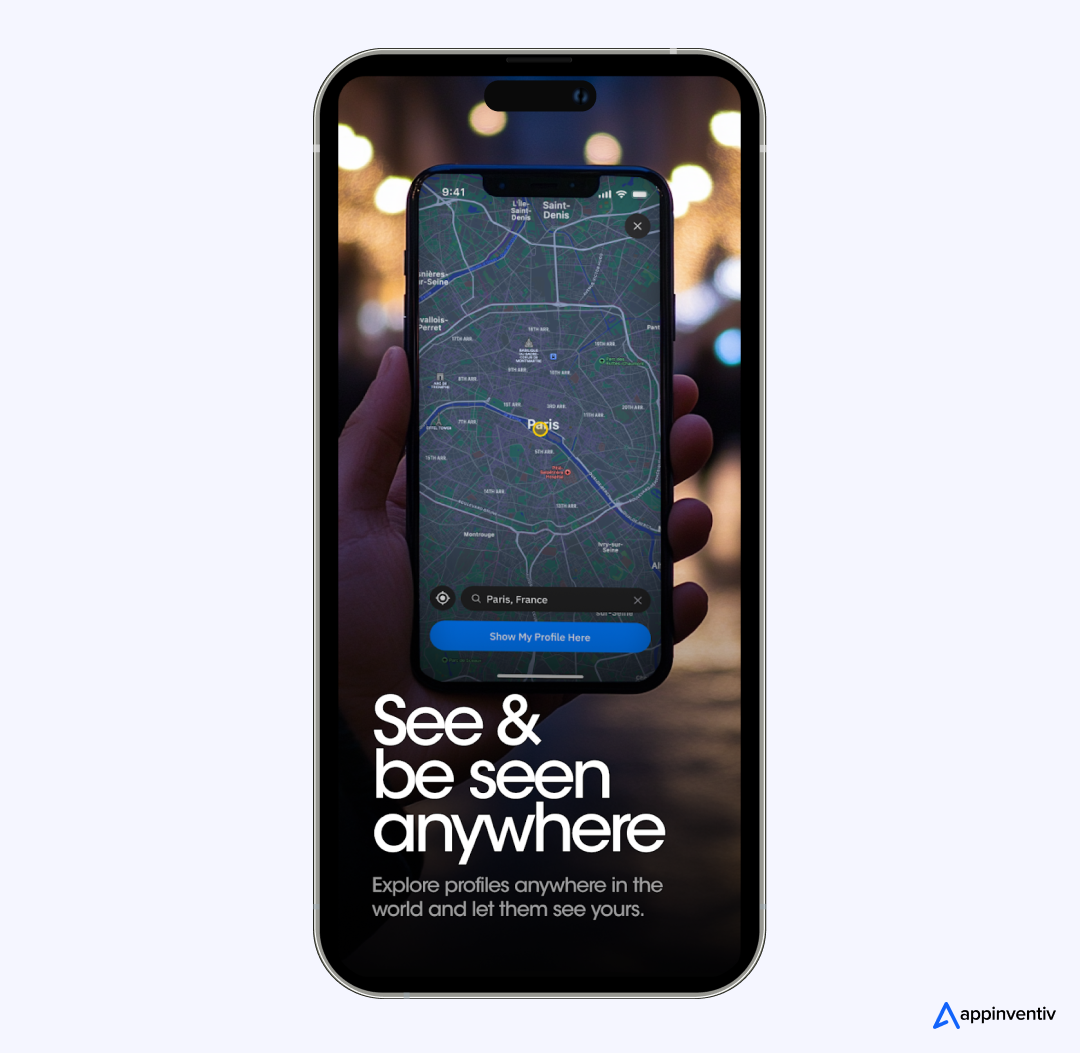
Push Notifications & Alerts
Well-timed alerts bring people back. Messages, likes, profile views-these nudges matter. But let users control how often they hear from you, or they’ll tune out.
Security & Privacy Controls
In LGBTQ+ dating app development, safety is non-negotiable. Encryption, two-factor login, block/report tools, and private browsing options build confidence and protect your community.
Media Sharing
People want to share more than words. Secure photo and video sharing is essential, but so is control. Features like disappearing images or hidden albums give users choice over what they reveal.
Activity & Status Indicators
Simple signals like online now, last active, premium badges help set expectations. Give users the option to turn them off, so they’re in control of their visibility.
Advanced Features to Integrate in a Dating App Like Grindr
These extras are where the ROI lives. They raise the cost to build a dating app like Grindr, but they also keep users engaged longer and open up new revenue streams. Here are some of the other important features to build a Grindr clone app that stands out.
AI-Powered Matchmaking
Location may get users in the door, but AI is what makes them stay. In Grindr-like app development, AI moves beyond basic swipes and filters to deliver curated matches that feel relevant, not random. By learning from user behavior, preferences, and conversations, the AI-powered dating apps keep improving over time, building engagement and loyalty that generic dating apps struggle to maintain.
| AI Feature | What It Does | Business Impact |
|---|---|---|
| Smart Match Suggestions | Generates tailored profile recommendations using behavioral data and preferences | Keeps users engaged longer by surfacing more relevant matches |
| Compatibility Scoring | Assigns scores based on shared interests, activity levels, and communication style | Helps users focus on high-potential matches, reducing churn |
| Dynamic Interest Mapping | Adapts to evolving user preferences and updates recommendations automatically | Makes the app feel “alive” and responsive to user behavior |
| Conversational AI Insights | Analyzes chat patterns to refine future match recommendations | Increases stickiness by improving the quality of conversations |
| Adaptive Discovery Feed | Ranks and orders profiles in real time based on relevance | Reduces fatigue, boosts daily engagement, and supports premium upsells |
For leaders, the takeaway is simple: AI isn’t a gimmick here but is the engine that drives retention, premium conversions, and ultimately ROI in LGBTQ+ dating app development.
In-App Video & Voice Calls
Not everyone wants to share their number right away. Built-in calling gives users a safe way to connect, with blur filters or short timed calls making first interactions less intimidating.
Safety Features & Moderation Tools
Trust is everything. AI moderation, panic buttons, and instant flagging of abusive content protect users and show that safety is part of your brand promise.
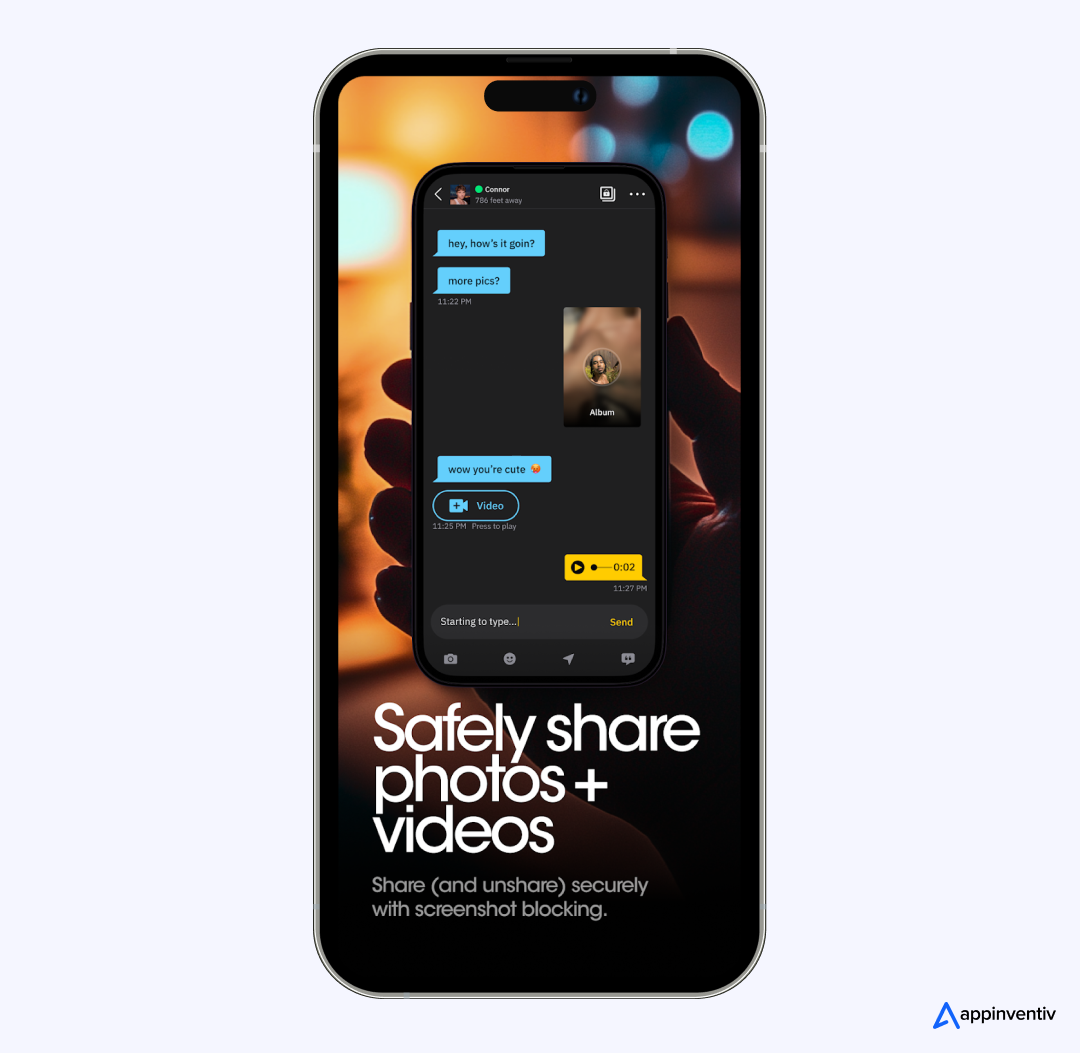
Events & Communities
One-to-one dating is just the start. Adding group chats, local event listings, or interest-based communities makes your app a hub, not just a tool.
Gamification & Engagement Boosts
Small touches like profile boosts, badges, daily streaks make the experience fun. These features drive habit, which is what keeps engagement (and revenue) high.
Premium Subscription Models
The Grindr app monetization model is proof that people will pay for better experiences. Unlimited swipes, advanced filters, ad-free browsing including subscriptions and in-app purchases are what turn a good app into a sustainable business.
Multi-Language & Localization
Scaling globally means speaking the language, literally. Multi-language support and regional tweaks expand reach and make the app inclusive from day one.
Social & Community Features
Safe spaces and community boards give users more reasons to stay. It’s not just dating; it’s belonging. That shift is what builds loyalty.
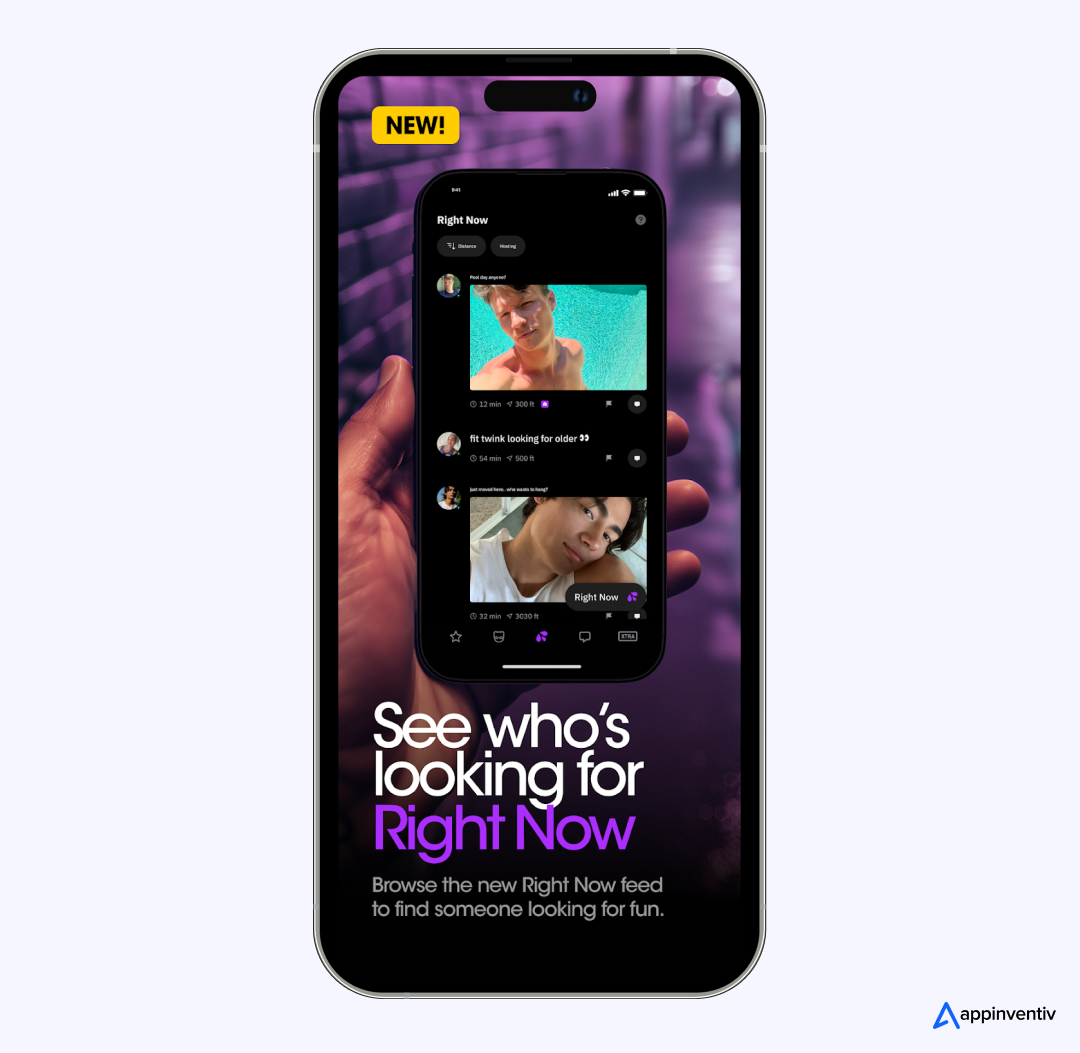
API & Third-Party Integrations
Integrations like payments, identity verification, even wearables add convenience but also increase Grindr clone app development costs. Done right, they enhance trust and open new opportunities for growth.
The Roadmap to Building a Grindr-Like Dating App
Building a dating app like Grindr is a process that moves from idea to launch in clear stages. Skipping steps usually shows up later as higher costs or weaker adoption. Here’s a practical view of the steps to build an app like Grindr.
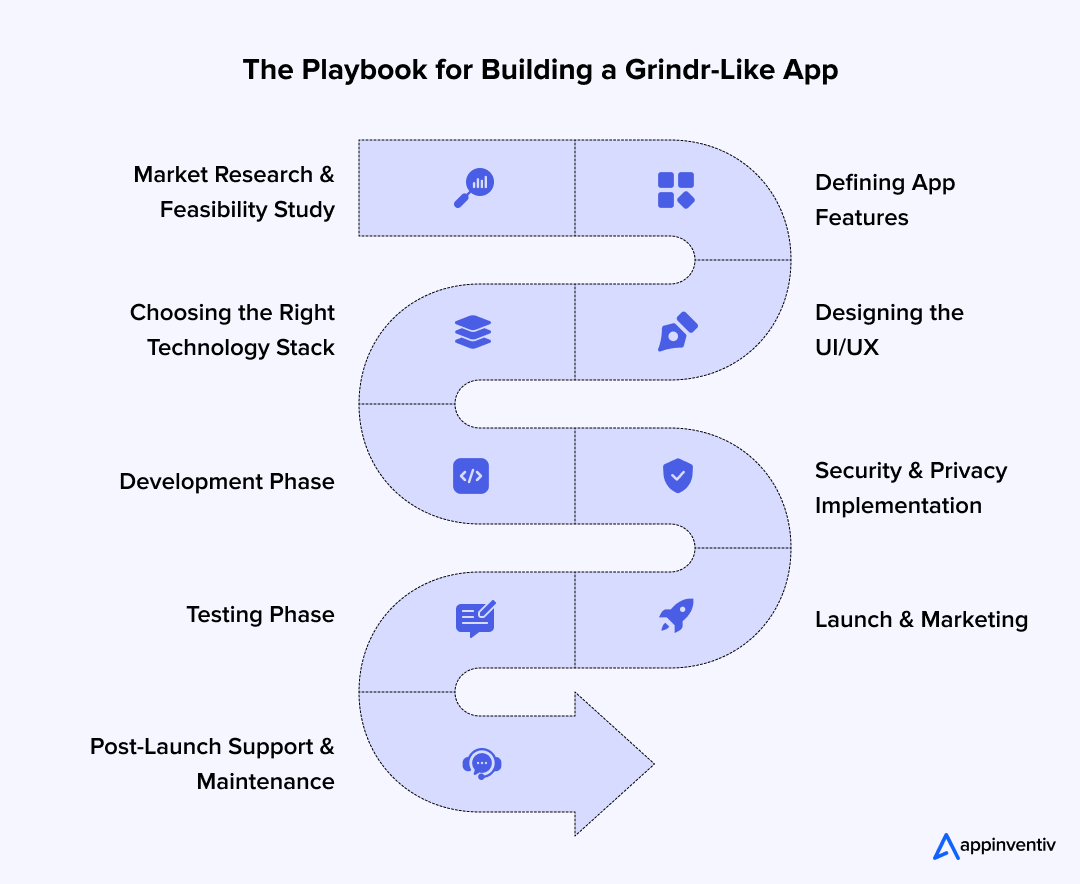
Market Research & Feasibility Study
Start with research, not code. Understand who your users are, what they value in gay dating app development, and how competitors approach safety and monetization. This groundwork shapes everything that follows.
Defining App Features
Decide what your MVP must include- like profiles, chat, location-based matching and which advanced features can wait. Planning features this way keeps your Grindr clone app development costs aligned with actual demand.
Choosing the Right Technology Stack
The tech stack for developing an LGBTQ dating app like Grindr determines performance and scalability. For a global audience, frameworks like Flutter or React Native work well for mobile, while Node.js or Firebase can handle the backend. The choices here impact both cost and speed.
Designing the UI/UX
A LGBTQ+ dating app development project lives or dies on design. The interface should feel inclusive, easy to navigate, and quick to respond. Poor UX is one of the top reasons dating apps lose users.
Development Phase
This is where design meets code. Backend teams build servers, databases, and APIs for real-time chat and location. Frontend teams turn designs into working apps for iOS, Android, and possibly web. Clear sprints keep progress visible.
Security & Privacy Implementation
Dating apps handle sensitive data. Encryption, two-factor login, and robust moderation tools must be baked in from the start. For gay dating app development, privacy features aren’t extras but are critical for adoption.
Testing Phase
Testing goes beyond “does it work.” Functional testing ensures chats, notifications, and profiles run smoothly. Performance testing checks how the app behaves under load. Security testing looks for leaks before attackers do.
Launch & Marketing
Once the app is stable, it’s time to launch. App store deployment is just the start; early marketing like SEO, influencer partnerships & targeted ads makes or breaks user adoption. Launching without promotion is like opening a shop without a sign.
Post-Launch Support & Maintenance
The work doesn’t stop at launch. Continuous updates, bug fixes, and new features keep your app relevant. Ongoing support is a line item in every Grindr-like app development cost plan, not an afterthought.
Let’s create a next-gen LGBTQ+ dating app that scales and monetizes fast.
How Apps Like Grindr Make Money: Understanding the Monetization Strategies
The Grindr app monetization model proves that dating apps can be both free to join and profitable at scale. Let’s look into the answer to the question- How to monetize a gay dating app like Grindr?
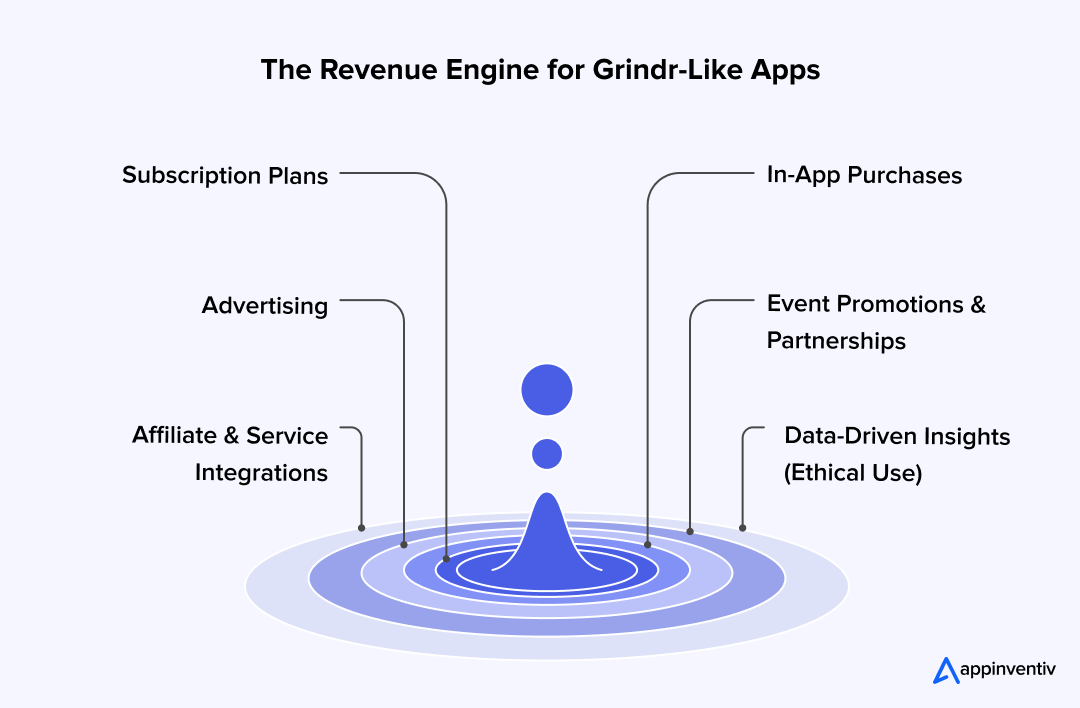
Subscription Plans
Premium tiers unlock advanced filters, unlimited messaging, or the ability to see who viewed your profile. This steady recurring revenue is the backbone of most LGBTQ+ dating app development businesses.
In-App Purchases
Features like profile boosts or spotlight visibility give users quick wins. Small, one-time purchases add up and let non-subscribers still contribute to revenue.
Advertising
Free users often see ads. Targeted ad placements inside a Grindr clone app can generate significant passive income, especially as the user base grows.
Event Promotions & Partnerships
Partnerships with brands or event organizers create new streams of income. Sponsored events or in-app promotions connect businesses directly with engaged communities.
Affiliate & Service Integrations
Some dating apps also make money and earn commissions by linking users to external services such as health resources, lifestyle brands, or travel offers. These integrations diversify revenue without overloading the core product.
Data-Driven Insights (Ethical Use)
Aggregated, anonymized insights about user behavior can be valuable for research or partner collaborations. While this must be handled carefully for privacy, it shows how gay dating app development can open indirect revenue channels.
Challenges in Developing a Dating App Like Grindr
Even though the benefits of developing an app like Grindr are clear, building such a platform comes with its own set of hurdles. Beyond coding and design, leaders have to deal with privacy concerns, scalability, compliance, and the ever-changing expectations of users. If these challenges aren’t addressed early, they can delay launches and inflate budgets. Here are some of the key challenges and solutions in developing a dating app like Grindr.
| Challenge | What It Means | Possible Solution |
|---|---|---|
| User Privacy & Data Security | Dating apps handle sensitive data such as personal preferences, photos, and location. Any breach damages trust and brand reputation. | Invest in end-to-end encryption, two-factor authentication, and strict data policies. Regular security audits should be part of the development plan. |
| High Competition | The market is crowded with both mainstream and niche players. Standing out is harder than ever. | Differentiate with unique features like AI matchmaking, events, or community tools. Align your strategy with the Grindr app monetization model to create sustainable revenue. |
| Scalability Under Growth | Apps may perform well with a few thousand users but crash when usage spikes. | Build scalable infrastructure on cloud platforms. Load testing during development reduces surprises after launch. |
| Regulatory Compliance | Privacy regulations like GDPR and CCPA apply globally, and LGBTQ+ communities face unique risks if compliance is weak. | Work with legal advisors from the start to build-in AI compliance. Bake compliance requirements into your Grindr clone app development roadmap, not as an afterthought. |
| User Safety & Moderation | Fake accounts, harassment, and harmful behavior can destroy user trust. | Deploy AI moderation, quick block/report options, and safety features like panic buttons to protect the community. |
| Retention & Engagement | Dating apps face high churn where users often leave once they find matches or lose interest. | Use gamification, personalized notifications, and regular feature updates to keep users active. |
| Monetization Balance | Overloading users with ads or paywalls can backfire. | Follow a balanced model with free core features and optional paid upgrades. Test pricing carefully in different markets. |
| Cultural Sensitivity & Localization | What works in one region may not resonate globally. LGBTQ+ acceptance varies, and so do user needs. | Add multi-language support and customizable privacy settings. Tailor features to fit cultural and legal contexts. |
Why Partner with Appinventiv for Your Grindr-Like Dating App Development
Knowing the cost to build a dating app like Grindr is only half the picture. Turning that number into a living product takes the right social media app development company like Appinventiv that understands tech, design, and the unique needs of the LGBTQ+ community.
Experience That Matters
We’ve spent years helping companies bring bold app ideas to life. From niche startups to global brands, our teams know what it takes to launch fast and scale smart. That includes deep know-how of gay dating apps, where details around safety and inclusivity matter just as much as features.
Security Comes First
Users share personal photos, locations, and private chats. One slip and trust is gone. That’s why our builds start with security, protected by encryption, two-factor logins, moderation tools, so privacy isn’t bolted on later, it’s there from day one.
A Tailored Approach
Every idea is different. Some leaders want Grindr-like apps to get to market quickly. Others need a custom platform with unique branding, new features, and global reach. We design around your priorities, not a one-size-fits-all template.
Ready for Growth
Day one success means nothing if the app can’t handle growth. We build for spikes, for expansion, for tomorrow’s user base. Whether it’s iOS, Android, or web, scalability is baked into the architecture.
Support Beyond Launch
The first release is just the start. Markets change fast, and apps need to evolve just as quickly. We stick around with updates, feature rollouts, and support that keeps you ahead of competitors.
When you’re ready to create something that goes beyond “just another dating app,” we’ll help you build a platform that users trust, enjoy, and keep coming back to.
FAQs
Q. How much does it cost to make a dating app like Grindr?
A. The cost to develop a dating app like Grindr isn’t one fixed figure and really depends on what you’re building towards. If all you want is an MVP with profiles, location-based discovery, and simple chat, you’re looking at something in the $40K to $70K range. But most businesses don’t stop there.
Once you add in AI-based recommendations, in-app calling, layered security, and compliance for global markets, the number can climb beyond $200K. And don’t forget, development is just the beginning and you’ll keep spending on cloud hosting, feature rollouts, and regular updates as long as the app is live.
Q. How long does it take to develop a Grindr clone app??
A. To create an app like Grindr, businesses don’t just need a quick sprint but more of a phased journey. A lean build can be out in four to six months, but that’s only the minimum viable version. A full product with advanced Grindr-like app development features can stretch to eight or even twelve months.
And if you’re aiming at a global rollout with enterprise-level scalability, it can easily run twelve to fifteen months. The real time sink often isn’t the coding but is the testing, security reviews, and iterations that make sure the app holds up in real-world use.
Q. What makes Grindr like app development different from other dating apps?
A. A standard dating app is mostly about swipes, matches, and basic messaging. Grindr-like app development is different because it puts location at the core, meaning its geosocial first and everything else comes after.
That indicates you’re not just building matching logic, you’re handling real-time data at scale. On top of that, LGBTQ+ audiences expect stronger privacy controls, more inclusive design, and safety features that go beyond the usual. It’s these community-first details that raise both the complexity and the stakes compared to generic dating apps.
Q. How do LGBTQ+ dating apps ensure safety and compliance?
A. Safety isn’t something you tack on later, it has to run through the whole build. In LGBTQ+ dating apps, you’ll see layers like encrypted messaging, two-factor login, quick block and report options, even panic buttons in some cases. AI moderation is becoming standard to catch harassment or inappropriate content early.
And on the compliance side, regulations like GDPR or CCPA can’t be ignored if you’re going global, you need legal reviews and audit trails from day one. It’s not cheap, but one slip on privacy can cost more than the entire build.
Q. What’s the best monetization strategy for Grindr-like apps?
A. There isn’t a single “best” way but usually a mix. Look at the Grindr app monetization model: subscriptions are the backbone, giving users ad-free browsing, unlimited swipes, and advanced filters. Then you layer in in-app purchases like profile boosts or spotlight visibility, which appeal to users who want quick results. Ads are another lever, but they need to be subtle and should not push too hard, leading to user churn.
Finally, partnerships and community events can open up new revenue for Grindr-like apps while strengthening loyalty. The sweet spot is balance: free users get enough to stick around, while premium upgrades feel genuinely worth paying for.


- In just 2 mins you will get a response
- Your idea is 100% protected by our Non Disclosure Agreement.
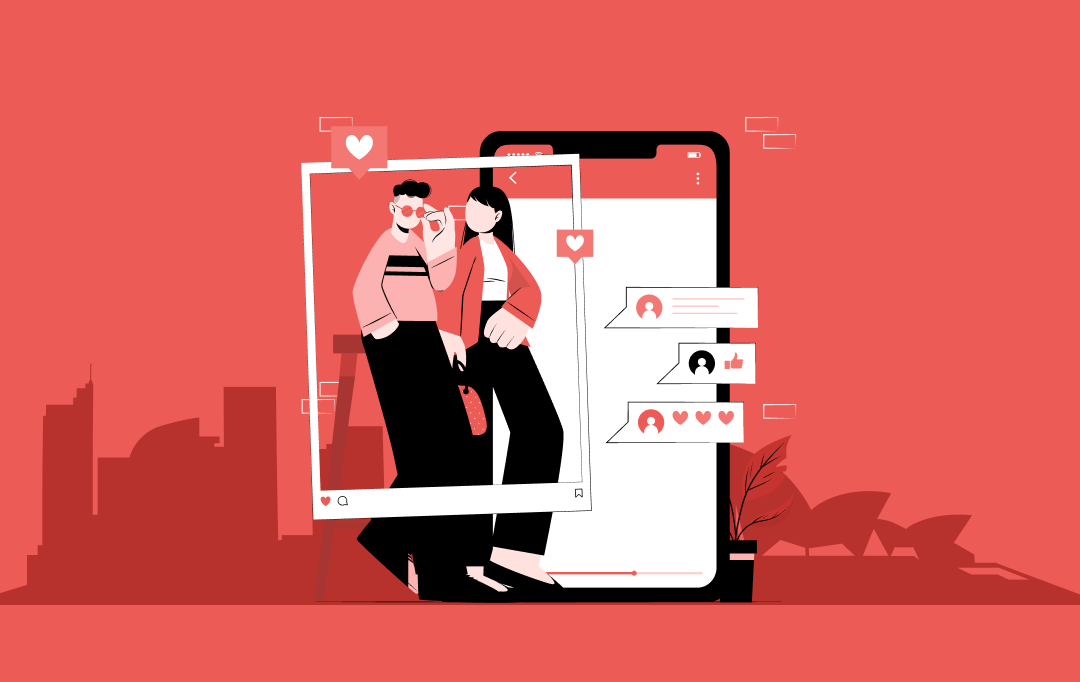
Dating App Development in Australia: Features, Process and Costs
Key takeaways: In Australia, the adoption of dating apps shows no signs of slowing, and the market is expected to reach a value of $58.4 million by 2029. Features like geolocation, profile management, real-time messaging, video calls, and privacy settings are crucial to ensure a seamless user experience and user engagement. It's important to consider…

How to Build AI-Powered Dating Apps: A Step-by-Step Guide
Key takeaways: By tracking preferences and behavior of users, AI is used to match them together more effectively than an algorithm does, resulting in greater satisfaction and engagement of the users. The dating application market is projected to experience tremendous growth, and this is where AI-powered dating applications can be innovative and seize a portion…

How Do Social Media Apps Make Money? Revenue Models and Monetization Strategies
The era of digital revolution is in full swing, and social media apps are at the forefront, continuously transforming the digital landscape. They are not just platforms for personal expression but have evolved into critical tools for business growth, cultural influence, and real-time global communication. With users increasingly turning to these apps for everything from…


























